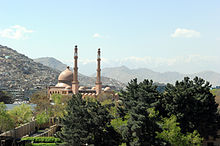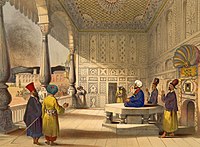
| Part of a series on the |
| Culture of Afghanistan |
|---|
 |
| History |
| People |
| Languages |
| Mythology |
| Cuisine |
| Festivals |
| Religion |
| Sport |
| History of Afghanistan |
|---|
 |
| Timeline |
The culture of Afghanistan[1][2] has persisted for centuries[3] and encompasses the cultural diversity of the nation. Afghanistan's culture is historically strongly connected to nearby Persia, including the same religion, as the people of both countries have lived together for thousands of years. Its location at the crossroads of Central, South and Western Asia historically made it a hub of diversity, dubbed by one historian as the "roundabout of the ancient world".[4]
Afghanistan is a mostly tribal society with different regions of the country having their own subculture. Despite this, nearly all Afghans follow Islamic traditions, celebrate the same holidays, dress the same, consume the same food, listen to the same music and use Persian as the inter-ethnic lingua franca to a certain extent. Its culture is strongly tied with elements of Central Asia,[5][6] which can be seen in the likes of language, cuisine and classical music.
Afghan culture is increasingly becoming a dynamic realm of academic study in scholarly terms.[7] In more recent history, Afghan culture has been threatened and fragmented due to the prolonged conflict in the country.[8][9]
- ^ Banting, Erinn (2003). Afghanistan: The land. Crabtree Publishing Company. p. 4. ISBN 0-7787-9335-4. Retrieved August 22, 2010.
- ^ Cite error: The named reference
AOwas invoked but never defined (see the help page). - ^ "Country Profile: Afghanistan" (PDF). Library of Congress. August 2008. Archived from the original (PDF) on December 3, 2010. Retrieved August 16, 2010.
- ^ "A brief history of Afghanistan". November 2, 2008.
- ^ Denise Cush, Catherine Robinson, Michael York (2012). Encyclopedia of Hinduism. Routledge. p. 200. ISBN 9781135189792.
{{cite book}}: CS1 maint: multiple names: authors list (link) - ^ "The remarkable rugs of war, Drill Hall Gallery". The Australian. July 30, 2021. Archived from the original on August 16, 2021.
- ^ American Institute of Afghanistan Studies. "Afghanistan (an academic journal) published by Edinburgh University Press". Archived from the original on May 25, 2020.
- ^ Goodson, Larry; ﺟﻮﺩﺳﻮﻥ, ﻻﺭﻱ (1998). "The Fragmentation of Culture in Afghanistan / ﺍﻟﺘﺸﻈﻲ ﺍﻟﺜﻘﺎﻓﻲ ﻓﻲ ﺃﻓﻐﺎﻧﺴﺘﺎﻥ". Alif: Journal of Comparative Poetics (18): 269–289. doi:10.2307/521889. JSTOR 521889.
- ^ "Redeeming the Pashtun, the ultimate warriors - Macleans.ca".